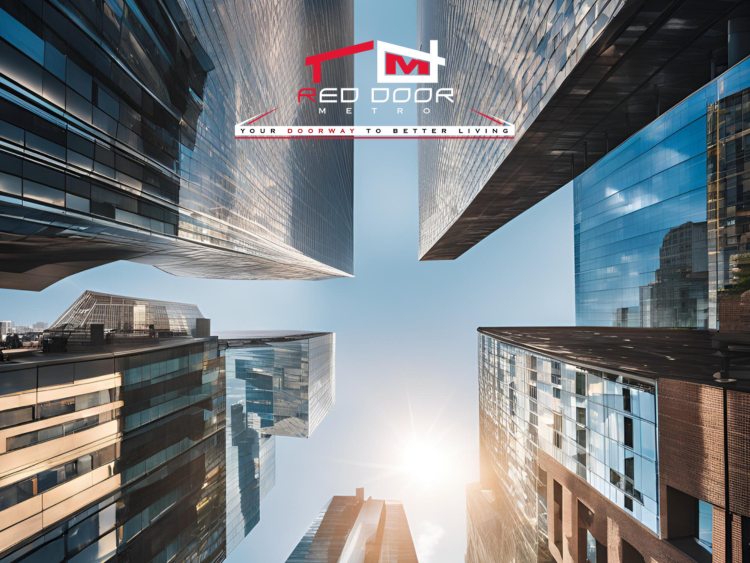Commercial real estate (CRE) has long been seen as a solid investment opportunity, offering both income potential and long-term appreciation. But is it the right choice for you? In this guide, we will break down the benefits, risks, and key factors to consider, along with real-world examples and data comparisons to help you make an informed decision.

Understanding Commercial Real Estate
Commercial real estate refers to properties used for business purposes, including:
- Office Buildings (corporate headquarters, coworking spaces)
- Retail Spaces (shopping malls, standalone stores)
- Industrial Properties (warehouses, distribution centers)
- Multi-Family Units (apartment buildings with five or more units)
- Hospitality Properties (hotels, resorts)
Each type of CRE has its own unique risks and benefits, and the best choice depends on factors such as location, market demand, and investment goals.
Benefits of Investing in Commercial Real Estate
1. Higher Income Potential
Commercial properties often offer higher returns compared to residential properties. The average annual return on CRE investments ranges from 6% to 12%, while residential properties typically yield 1% to 4%.
Example: Retail Space vs. Residential Rental
A 3,000 sq. ft. retail space in a busy shopping district can generate $10,000/month in rental income, while a 3-bedroom residential home in the same area might rent for only $3,000/month.
2. Longer Lease Terms = More Stability
Commercial leases are typically 5-10 years, compared to 12-month leases for residential properties. This ensures consistent cash flow and minimizes tenant turnover.
Case Study: Office Building in Washington, D.C.
A tech company signed a 10-year lease for a Class A office building in downtown D.C., providing the property owner with a stable revenue stream of $250,000 per year.
3. Property Appreciation & Equity Growth
CRE properties appreciate over time, allowing investors to build equity. Prime commercial locations tend to appreciate faster than residential areas.
Example: Industrial Warehouse Investment
A 100,000 sq. ft. warehouse in Dallas, TX, was purchased for $5 million in 2015. Due to increased demand for distribution centers, the property is now valued at $9 million in 2024.
4. Tax Benefits & Deductions
Commercial investors can take advantage of tax deductions, including:
- Depreciation write-offs
- Mortgage interest deductions
- Property management costs
- Maintenance and repair expenses
Example: Tax Savings
A commercial investor with a $2 million retail space can deduct $70,000 in depreciation annually, reducing taxable income.
Risks & Challenges of Commercial Real Estate
1. Higher Initial Investment & Maintenance Costs
CRE properties require a larger upfront investment compared to residential properties.
Comparison: Residential vs. Commercial Down Payments
- A single-family rental home may require $50,000 as a 20% down payment.
- A small office building may require $250,000 or more.
Additionally, maintenance costs can be significant, especially for larger properties.
2. Market Fluctuations & Economic Downturns
CRE is more affected by economic cycles than residential real estate. During recessions, office buildings and retail spaces may experience higher vacancy rates.
Example: COVID-19 Impact on Office Spaces
During the pandemic, office vacancy rates in New York City rose to 16.3%, compared to 8.5% pre-pandemic, as companies shifted to remote work.
3. Tenant Dependence & Vacancy Risks
A single large tenant leaving can significantly impact cash flow.
Example: Shopping Mall Closures
Malls dependent on anchor tenants like Sears or JCPenney struggled when these retailers closed, leading to an overall decrease in property value and rental income.
How to Determine if CRE is Right for You
1. Evaluate Your Investment Goals
- Are you looking for short-term gains or long-term wealth building?
- Do you prefer high-risk, high-reward investments or stable income streams?
2. Assess Market Conditions
Look at:
- Vacancy rates in the target area
- Job growth & economic trends
- Demand for commercial spaces
3. Consider Financing Options
- Traditional bank loans (require 20-30% down payment)
- Real Estate Investment Trusts (REITs for passive investing)
- Syndications & partnerships (pooling funds with other investors)
Conclusion: Is Commercial Real Estate a Good Investment?
Yes, commercial real estate can be a great investment—if done strategically. It offers higher income potential, longer lease stability, and valuable tax advantages, but also comes with higher risks and larger upfront costs. The key to success is thorough market research, smart financing, and strong property management.
Final Takeaway
If you’re a long-term investor with sufficient capital and a willingness to manage risks, commercial real estate can be a highly profitable asset class. However, if you’re looking for a lower-risk, hands-off approach, REITs or residential properties may be a better fit.
FAQs
1. Is commercial real estate a good investment?
Yes, commercial real estate (CRE) can be a great investment. It offers higher income potential, long-term appreciation, and diversification. However, success depends on location, market trends, and management.
2. Why invest in commercial real estate in Virginia, DC, and Maryland?
These areas have strong economies, high demand for office and retail spaces, and a growing population. DC has a steady government-driven economy, while Virginia and Maryland offer diverse business opportunities.
3. What types of commercial properties can I invest in?
Common options include:
- Office buildings
- Retail stores & shopping centers
- Industrial warehouses
- Multifamily apartments
- Hotels
- Mixed-use properties
4. How much money do I need to invest in commercial real estate?
It depends on the property type and location. In cities like Washington, DC, commercial properties can range from $500,000 to several million dollars. Smaller cities in Virginia and Maryland may offer lower entry points.
5. How does commercial real estate compare to residential real estate?
Commercial real estate typically has higher returns, longer lease agreements, and higher upfront costs than residential real estate. It’s often more stable but requires more management and expertise.
6. What are the risks of investing in commercial real estate?
Risks include:
- Market downturns
- Vacancies and tenant defaults
- High maintenance costs
- Interest rate changes
7. How do I finance a commercial real estate investment?
Financing options include:
- Traditional bank loans
- SBA loans (Small Business Administration loans)
- Commercial mortgage-backed securities (CMBS)
- Private investors or partnerships
8. How do I find the right commercial property?
Work with a local real estate agent or a commercial broker who knows the market in Virginia, DC, or Maryland. Also, research neighborhoods, demand, and future developments.
9. What should I look for in a commercial property?
Consider location, tenant quality, lease terms, property condition, and market trends. Areas like Arlington, VA and Bethesda, MD are prime locations due to economic growth.
10. How do commercial leases work?
Commercial leases are typically longer than residential leases (5-10 years). The three main types are:
- Gross Lease: Tenant pays a fixed rent, landlord covers expenses.
- Net Lease: Tenant pays rent plus some operating costs.
- Triple Net (NNN) Lease: Tenant covers rent, taxes, insurance, and maintenance.
11. What are the tax benefits of owning commercial real estate?
Owners can benefit from:
- Depreciation deductions
- Mortgage interest deductions
- Capital gains tax advantages
- 1031 Exchange (deferring taxes on profits by reinvesting in another property)
12. How do I determine the value of a commercial property?
Valuation methods include:
- Income Approach: Based on rental income.
- Comparative Sales Approach: Compares similar properties in the area.
- Cost Approach: Estimates the cost to rebuild the property.
13. What is the average return on commercial real estate?
Returns vary by market and property type, but 7% to 12% annual returns are common for commercial real estate investments.
14. Can I invest in commercial real estate with little money?
Yes! Options include:
- Real Estate Investment Trusts (REITs)
- Crowdfunding platforms
- Joint ventures with partners
- Seller financing
15. How do I manage a commercial property?
You can either:
- Hire a property management company
- Manage it yourself (if you have experience)
- Use a hybrid approach (outsourcing some services)
16. What cities in Virginia, DC, and Maryland have the best commercial real estate markets?
- Washington, DC – High demand for office space and retail.
- Arlington, VA – Tech and government-driven growth.
- Richmond, VA – Affordable and growing commercial sector.
- Bethesda, MD – Strong medical and office space market.
- Baltimore, MD – A rising market for industrial and mixed-use properties.
17. Is now a good time to invest in commercial real estate?
It depends on the market cycle. Interest rates, demand, and economic conditions all affect the timing. Consulting a local expert is recommended.
18. What are the best commercial real estate investment strategies?
- Buy and hold (long-term rentals)
- Fix and flip (renovate and sell)
- Development projects (building from scratch)
- REITs and syndications (hands-off investments)
19. What is a cap rate, and why is it important?
Cap rate (capitalization rate) measures return on investment. It’s calculated as:
📌 Cap Rate = Net Operating Income (NOI) / Purchase Price
A higher cap rate means higher risk but more potential returns.
20. How do I attract tenants for my commercial property?
- Offer competitive lease terms
- Keep the property well-maintained
- Market the property online and through brokers
- Target growing businesses and franchises
21. How long does it take to profit from commercial real estate?
It depends on the deal structure. Some investors see profits in 1-3 years, while others hold properties for 10+ years for long-term appreciation.
22. What are common mistakes new investors make?
- Not researching the market
- Underestimating costs
- Ignoring property management needs
- Overleveraging with too much debt
23. How does zoning affect commercial real estate?
Zoning laws control what type of business can operate in a location. Check with local zoning authorities before buying a property in DC, Maryland, or Virginia.
24. What is a 1031 Exchange, and how does it benefit investors?
A 1031 Exchange allows investors to defer capital gains taxes by reinvesting profits into another commercial property.
25. Should I invest in a commercial property alone or with partners?
It depends on your finances and experience. Partnerships can reduce risk, but you’ll have to share profits. Going solo gives you full control but higher risk.


